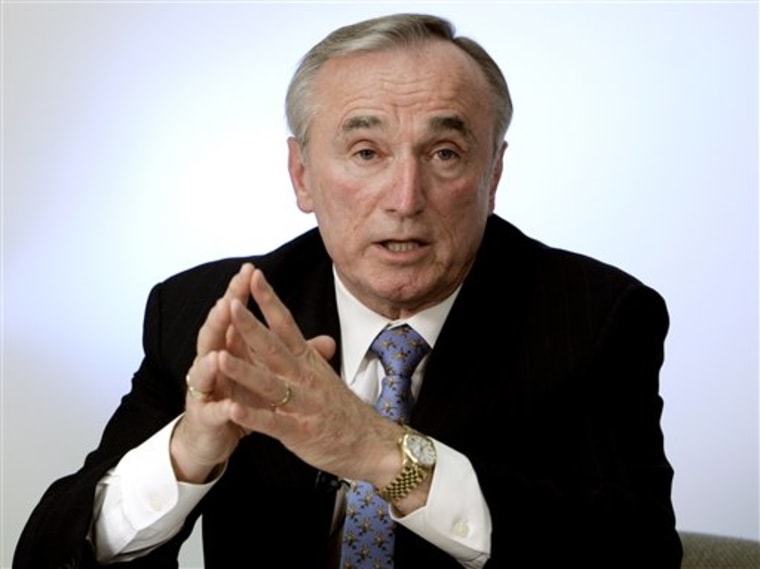Police Chief William Bratton stunned the city Wednesday by announcing he will step down after a seven-year tenure in which he instituted major reforms of the once-scandalized Police Department and began a turnaround of its relations with minorities.
"For me personally and professionally it is the right time," Bratton, 61, told a City Hall news conference where he revealed he will begin working with a global security firm.
Bratton said when he came to the Police Department, "it was a troubled organization in what was arguably a very troubled city."
He cited achievements since then in dramatically reversing what had been increasing crime rates and in keeping Los Angeles safe from potential terrorist attacks in the post-9/11 era.
But he hoped his legacy would be improvements in race relations.
"I believe we have turned a corner in that issue, in that this is a city that is proud of its racial diversity, it is a city where people work together. It is my belief that the Los Angeles Police Department has played a significant role in bringing that about," he said.
Bratton's resignation will be effective Oct. 31. He will then join Altegrity Inc. of Falls Church, Va., focusing on bringing professional policing to emerging nations.
His departure, less than halfway through his second term, caught city leaders unaware.
"I'm in mourning today," said John Mack, a high-profile African-American member of the civilian Police Commission who in his past role as leader of the Los Angeles Urban League was a frequent critic of the department.
"The people of Los Angeles are safer than they've been in half a lifetime," added City Council President Eric Garcetti, crediting Bratton for reforms and for knocking down the crime rate to levels not seen in decades.
Bratton's decision came just weeks after a judge released the department from eight years of oversight by the U.S. Department of Justice, which had alleged a long pattern of abuse.
Former Mayor James Hahn, who originally picked Bratton, said the results speak for themselves.
"The consent decree has been lifted, crime is down, and the community has much greater confidence in the department and its professionalism," said Hahn, now a county judge.
Bratton 'changed the culture' of department
African-American commentator and community activist Earl Ofari Hutchinson said Bratton's departure will be a "tremendous blow" to the city.
"Bratton did more than any other chief in recent times to really push the envelope on reform, minority recruitment, community policing, resolving tensions in Los Angeles between minority communities and the Police Department," Hutchinson said.
Bratton changed "the culture of the department that was seen as brutal and oppressive to a department that is seen and regarded and hailed as a department that is committed and dedicated to a true partnership with community residents and organizations," he said.
Even the city police union praised Bratton while acknowledging some disagreements.
"He successfully used his visibility to strengthen partnerships between LAPD and the residents it serves," Police Protective League President Paul M. Weber said in a statement.
Bratton was picked to lead the Los Angeles department in 2002 after heading police forces in New York City and Boston.
At the time, Los Angeles police were still struggling to emerge from under the clouds of the 1991 Rodney King beating and the Rampart police corruption scandal later in the decade.
Bratton is two years into his second and final five-year term. The City Charter would have to be changed for him to serve a third term.
Los Angeles police chiefs once enjoyed unlimited tenures. Changes in the charter under reforms driven by the King beating and resulting 1992 riot led to limits.
Diverse city, diverse police force
One goal of the Bratton administration was to make the force more closely resemble the city.
The 10,000-officer force is now 42 percent Hispanic, 37 percent Caucasian, 12 percent black and 7 percent Asian, according to Gerald Chaleff, the civilian administrator in charge of the department's reform office.
Andre Birotte, the department's inspector general, who oversees internal investigations, said he was surprised and disappointed by Bratton's departure.
"He has made a lot of changes in the department and his reputation for transparency will be one of the hallmarks of his tenure," Birotte said.
